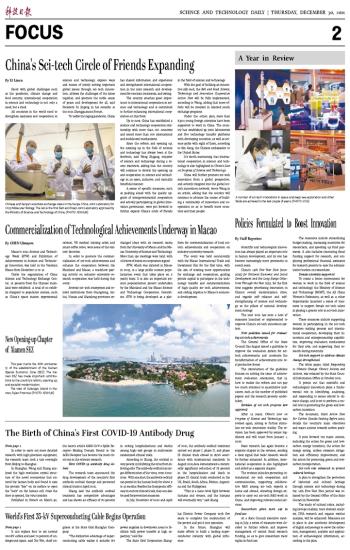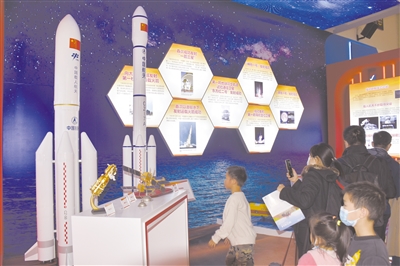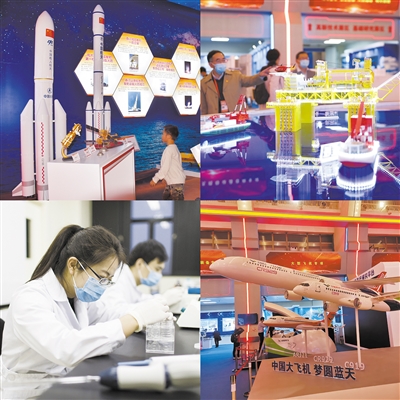
 |
 |
| A number of sci-tech innovations in space and deep-sea exploration and other fields are achieved in the last couple of years. (PHOTO: VCG) |
Scientific and technological innovation has always played an important role in human development, and its role has become increasingly more prominent in recent years.
China's 14th Five-Year Plan (2021-2025) for National Economic and Social Development and the Long-Range Objectives Through the Year 2035, for the first time suggests prioritizing innovation in China's overall modernization drive, and regards self-reliance and self-strengthening of science and technology as the pillars of national development strategy.
The year 2021 has seen a host of measures launched or implemented to improve China's sci-tech innovation system.
New guideline issued for evaluating sci-tech achievements
The General Office of the State Council this August issued a guideline to improve the evaluation system for sci-tech achievements, and accelerate the transformation of achievements into real productive forces.
The introduction of the guideline focuses on solving the issue of achievement evaluation orientation, that is, how to realize the reform and not pay too much attention to quantitative indicators, such as the number of published papers and the research projects undertaken.
Revision of sci-tech progress law approved
After 14 years, China's Law on Progress of Science and Technology was revised again, aiming to further stimulate sci-tech innovation vitality. The revision has been approved by senior legislators and will enact from January 1,2022.
Basic research has again become a separate chapter in the revision, sending a clear signal that basic research would be further enhanced. In addition, international cooperation is also highlighted and added as a separate chapter.
The revision inlcudes promoting international sci-tech cooperation and communication, supporting collaborative R&D among sci-tech experts at home and abroad, attracting foreign experts to carry out sci-tech R&D work in China, and improving relevant social services.
Researchers given more say in fund use
At a State Council executive meeting in July, a series of measures were decided to further reform and improve management of central fiscal research funding, so as to give researchers more rights in fund use.
The measures include streamlining budget-making, increasing incentives for researchers, and speeding up fund payments. It also includes innovating fiscal funding support for research, and employing professional financial assistants for research projects to ease the administrative burden on researchers.
Female scientists supported
To create a better environment for women to work in the field of science and technology, the Ministry of Science and Technology (MOST), the All China Women's Federation, as well as 11 other departments launched a series of measures to support female sci-tech talent in playing a greater role in sci-tech innovation.
These measures include supporting women in participating in the sci-tech decision-making process and international cooperation, developing their innovation and entrepreneurship capabilities, improving evaluation mechanisms for their jobs, and supporting their research during maternity.
Sci-tech support to address climate change strengthened
The white paper, titled Responding to Climate Change: China's Policies and Actions, was released by the State Council Information Office in October 2021.
It points out that scientific and technological innovation plays a fundamental role in identifying, analyzing, and responding to issues related to climate change, and is set to perform a crucial role in promoting the green and low-carbon transition.
The document, titled Action Plan For Carbon Dioxide Peaking Before 2030, details the country's main objectives and major actions towards carbon peaking.
It puts forward ten major actions, including the action for green and low-carbon energy transition, the action for energy saving, carbon emission mitigation and efficiency improvement, and the action for promoting green and low-carbon transportation.
Sci-tech role enhanced to protect cultural heritage
A plan to strengthen the protection of historical and cultural heritage through science and technology during the 14th Five-Year Plan period was released by the General Office of the State Council in November.
The study of cultural relics, including isotope analysis, trace element analysis, DNA research and organic residue analysis, will be enhanced. Measures are in place to also accelerate development of digital archaeology to serve the collection, management, analysis and application of archaeological information, according to the plan.


 Next
Next




